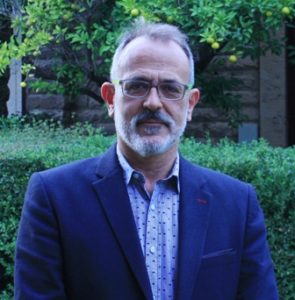
Former Directors

Manolis Plionis is a Professor at the Aristotle University of Thessaloniki (Physics Department), former Director and President of the Board of Directors of the National Observatory of Athens (2017-2025), an Adjunct Professor at the European University of Cyprus, Coordinator of the National Network for Climate Change-CLIMPACT (which has been nominated for the 2022, 2023, and 2024 international EarthShot Prize by the Institute of Sustainable Development of the European Public Law Organization), member of the Greek National Committee for Astronomy, former member of the European Space Science Committee (ESSC-ESF) for two terms, former President of the Hellenic State Thematic Committee on Climate Change, Energy & Sustainable Mobility (2020-2023), former Vice-President of the Governing Board of the Science and Technology Museum of NOESIS. He is also a member of the Scientific Committee of the ‘The Ultimate XMM Extragalactic X-ray Survey (XXL)’ project and of the Steering Committee of the corresponding International Consortium as well as a member of the International collaboration: Cosmology with HII galaxies.
He was born in Athens in 1960 and received a Mathematics degree from the University of Crete and a PhD in Observational Cosmology in 1989 from the University of Sussex (UK), supervised by Professor John Barrow. He was a postdoctoral researcher at the SISSA International Research Center in Italy for about 6 years, out of which 2 as a E.C. Marie Curie Fellow (under the Human Capital and Mobility program) and at the ICTP International Center of Theoretical Physics for 1 year. He returned to Greece in 1995 as a Researcher at the National Observatory of Athens where he reached the highest level of Research Director and remained until 2012. He was elected Professor at the Physics Department of the Aristotle University of Thessaloniki in 2009 and took up his position in 2012. He has been a visiting researcher of the Mexican Research Center Instituto Nacional de Astrofisica, Optica y Electronica (INAOE) for 13 years (2002-2015).
His research interests are related to Observational Cosmology, Large-Scale Structure of the Universe and Extragalactic Astrophysics, while his recent scientific interests extend to issues of Climate Change and associated natural disasters as well as on legal aspects of Space endeavors. He has published over 250 scientific articles as well as many popular science and policy articles, while he has supervised many Doctoral and Master dissertations. He is the author with Anthi Koskina of the book “Greek Space Law” by Springer Publishers https://link.springer.com/book/9783031728129, as well as an author and the editor of the book (in Greek) “Pseudosciences and conspiracy theories: a guide”, published by the University Editions of Crete, https://cup.gr/book/pseydoepistimes-kai-theories-synomosias/ . He was also one of the scientific editors of the Hellenic edition of the book “Climate and Society” by Leichenko Robin, O’Brien Karen https://papazissi.gr/book-author/obrien-karen/ .
He is a referee of Scientific Proposals for the Deutsche Forschungsgemeinschaft (DFG), the Ministry of Research & Innovation of Spain, the CONACYT of Mexico, the Hellenic ELIDEK & GSRT. He has been a member of the TAC Committee of NASA’s Chandra X-ray satellite (AO-11) and ESA XMM (AO-12, AO-13) and of the 10m GTC telescope of the Canary Islands, as well as reviewer of scientific articles of many international scientific journals, among which MNRAS, Astrophysical Journal, Astronomy & Astrophysics, etc.
He has organized 5 international Astrophysics/Cosmology Conferences, an International Postgraduate School and two Panhellenic Cosmology Conferences (“Large-Scale Structure in the X-ray Universe”, 1999, “Multiwavelength Cosmology” 2003, “X-ray Surveys” 2007, “Half a Century of X-ray Astronomy”, 2012, “Hot Spots in the XMM Sky”, 2016, “Α Panchromatic View of Clusters of Galaxies and the LSS”, 2005). He has also organized 2 workshops on Natural Disaster Management: in November 2017 on “Environment, Space, Natural Disasters”, under the auspices of the GSRT and in November 2019 on: “The Contribution of Research Centers in Disaster Management”, in collaboration with 10 other Research Centers under the coordination of NOA (http://www.naturaldisasters.noa.gr).
He is a member of the Editorial Board of the International Journal of Modern Physics D, (http://www.worldscientific.com/page/ijmpd/editorial-board), and of the Open Journal in Astrophysics (https://astro.theoj.org/) and publisher of the following conference proceedings: (a) Atlantic Sciences, Paris (ISBN 2-84394-227-6), (b) Κluwer ASSL Vol. 276, (c) Kluwer ASSL Vol. 301, (δ) Springer Lecture Notes in Physics, LNP Vol. 740.
He is a founding member and former member of the Governing Board of the “Hellenic Astronomical Society” (for 3 terms) and Vice-Chairman of the Board for a further term. He is also a founding member and a former member of the Governing Board for one term of the “Hellenic Society for Gravity, Relativity and Cosmology”.